#António Franco Alexandre
Explore tagged Tumblr posts
Text
António Franco Alexandre (1944)

Fica dentro de mim, como se fosse eterno o movimento do teu corpo, e na carne rasgada ainda pudesse a noite escura iluminar-te o rosto. No teu suor é que adivinho o rastro das palavras de amor que não disseste, e no teu dorso nu escrevo o verso em pura solidão acontecido. Transformo-me nas coisas que tocaste, crescem-me seios com que te alimente o coração demente e mal fingido; depois serei a forma que deixaste gravada a lume com sabor a cio na carícia de um gesto fingido. – António Franco Alexandre in Duende (assírio & alvim, 2002)
Nasceu em Viseu, Portugal, em 1944. Estudou matemática em Toulouse, na França, entre 1962 a 1969, terminando sua graduação nos Estados Unidos. É doutor em matemática pela Universidade de Harvard e doutor em filosofia pela Universidade de Lisboa, onde leciona na Faculdade de Letras. O poeta estreou em livro com Distância, uma pequena edição de autor de 1969, mas ao recolher todo o seu trabalho ao fim da década de 90 escolheu não incluir este livro. O próximo livro seria Sem Palavras nem Coisas, em 1974. A estes seguiram-se Cartucho (1976), Os Objectos Principais (1979), Visitação (1983), A pequena face (1983), As Moradas 1 & 2 (1987) e Oásis (1992), reunidos em Poemas (Lisboa: Assírio & Alvim, 1996).
14 notes
·
View notes
Text

— António Franco Alexandre.
0 notes
Text
segredava-te, do tempo o vão aspecto; existias de noite como a letra de todo o movimento, e das estrelas o céu pintado ao fundo; e distraído, às vezes, confessava amar a tua pele como quem quer dizer-te: não morras nunca mais. antónio franco alexandre quatro caprichos assírio & alvim 1999
9 notes
·
View notes
Text
segredava-te, do tempo o vão aspecto; existias de noite como a letra de todo o movimento, e das estrelas o céu pintado ao fundo; e distraído, às vezes, confessava amar a tua pele como quem quer dizer-te: não morras nunca mais.
António Franco Alexandre quatro caprichos
3 notes
·
View notes
Photo

COLECÇÃO VÁRIA, #3 Florilégio
organização: Maria Sequeira Mendes, Joana Meirim, Nuno Amado leituras/ensaios por: Akihiko Shimizu, Alberto Manguel, Alda Rodrigues, Alex Wong, Amândio Reis, Ana Cláudia Santos, Ana Maria Pereirinha, Ana Matoso, Ana Sofia Couto, António J. Ramalho, Bernardo Palmeirim, Clara Rowland, Diogo Martins, Fernando Cabral Martins, Frederico Pedreira, Golgona Anghel, Gustavo Rubim, Helder Gomes Cancela, Helena Carneiro, Inês Rosa, Joana Matos Frias, Joana Meirim, João Dionísio, Jorge Almeida, Lawrence Rhu, Lúcia Evangelista, Madalena Quintela, Madalena Tamen, Margarida Vale de Gato, Maria Rita Furtado, Maria Sequeira Mendes, Miguel Tamen, Nuno Amado, Pedro Serra, Pedro Sobrado, Rita Faria, Rosa Maria Martelo, Sara Campino, Sara de Almeida Leite, Silvina Rodrigues Lopes, Tatiana Faia, Telmo Rodrigues, Teresa Bartolomei poemas de: Abade de Jazente, Adélia Prado, Adília Lopes, Alberto Pimenta, Alice Oswald, Ana Hatherly, Anna Akhmátova, Anthony Hecht, António Franco Alexandre, António Gedeão, Arthur Rimbaud, Bernardim Ribeiro, Carlos de Oliveira, Charlotte Smith, Christopher Middleton, Elizabeth Bishop, Ellen Davies, Emily Dickinson, Fernando Assis Pacheco, Florbela Espanca, Frances Leviston, Francisco Alvim, G. E. Patterson, Golgona Anghel, Ian MacMillan, João Miguel Fernandes Jorge, John Betjeman, Jorge Sousa Braga, José Afonso, José Miguel Silva, Kenneth Goldsmith, Kudo Naoko, Leopoldo María Panero, Luís de Camões, Luiza Neto Jorge, Manuel Bandeira, Manuel Gusmão, Margarida Vale de Gato, María Elena Walsh, Maria Velho da Costa, Raymond Carver, Raul de Carvalho, Ricardo Tiago Moura, Rosa Maria Martelo, Tonia Tzirita Zacharatou, Wilfred Owen capa e ilustrações: João Concha ISBN: 978-989-53985-1-5 n.º de páginas: 232 tiragem: 350 exemplares 1.ª edição: Março, 2023 Recomendado no Plano Nacional de Leitura LER+ PVP 20,00 euros | ensaio |
5 notes
·
View notes
Text
António Franco Alexandre | Viseu 1944
António Franco Alexandre, no limiar entre o dizer e o não-dizer.
Créditos: https://ww2.instituto-camoes.pt A poesia da segunda metade do século XX inaugura uma nova modalidade narrativa, caracterizada por uma aleatoriedade que a aproxima da prosa. Essa aproximação, intencional e estratégica, visa desviar a narrativa de sua função tradicionalmente referencial, elevando-a a um plano estético de exuberância quase surreal. Em autores como Nuno Júdice, Vasco Graça…

View On WordPress
0 notes
Text

Bruce Cohen
Untitled (Still Life with Eggshells), 2010
oil on canvas
fico aguardando telegramas, os azuis recados.
o envelope da urgência o intervalo.
António Franco Alexandre
44 notes
·
View notes
Text
12
Sou tão exactamente igual a ti que alguns na rua nos confundem, trocam os nomes e as imagens, e murmuram que somos, de um poeta, os heterónimos. Meio século a mais, e umas penas marcadas com sinal no calendário, livros que li, e outros que deixei por escrever na arca dos achados, o corpo antigo que se vê, e esconde a raiva de ainda ter de lama feito o lume escuro, só por ti ardendo, são mera imprevidência dos sentidos. O mesmo sou que tu outrora foste, e amanhã serás tu quem sou agora. António Franco Alexandre, «12», Duende, Lisboa, Assírio & Alvim, 2002.
22 notes
·
View notes
Text
no fresco calor condicionado
de um quarto onde a luz não dá para ler, recito
estrofes e mitos; beijo-te, não é?
— António Franco Alexandre (fragmento)
3 notes
·
View notes
Text
Fica dentro de mim, como se fosse eterno o movimento do teu corpo, e na carne rasgada ainda pudesse a noite escura iluminar-te o rosto.
No teu suor é que adivinho o rastro das palavras de amor que não disseste, e no teu dorso nu escrevo o verso em pura solidão acontecido.
-- António Franco Alexandre
23 notes
·
View notes
Text
Aracne (p. 45) by António Franco Alexandre
I’ve been round the world, carried sometimes by the wind, sometimes perched on the back of the most vigorous migrating birds; I’ve been through deserts, I’ve seen beaches bordered by the vague human mist; adrift on high seas, I’ve visited the most desolate islands. Like a hero of antiquity, I could well consider the web of fate and give them the consistency of a story; adventures, episodes, casual shipwrecks, harsh exiles come to mind, and are, in the art of verse, figures of some obscure, primitive absence. Hanging from a beam, protected by the supporting walls of this raised house, like a ship above great depths, I could, with a little effort, have drawn on the white paper a new body of wings, to rest at last, all covered by a soft layer of memories. But even if I am to transform, I don’t aspire to the condition of a tombstone or more ephemeral monument to myself; nor am I in a hurry to be reminded of hazardous death this winter, armed rats spreading plague, others left on the iron wheels of fortune. I know well the human body is fragile, immature, a tad soft, not very colourful; it doesn’t have the classic cut of the beetle, or the frugal manner of the scarab; having hardly flowered, it soon grows old, and what little it builds is soon a mould of what never was, transfigured into shadows. So too will I be; no matter how often I am told that I am wasted in such mutation and that I even risk a ridiculous fall, I insist on being human for a day so that you may see me as I am: a grain of fine sand moving on the golden whisper of your skin, the brief shudder through your body, the lazy life of all the senses; and then, your equal, perhaps I’ll be the conqueror or let myself be conquered and be owned, with the vanity that comes to me from having the wise heart of a little spider.
0 notes
Text
É mais fácil de longe imaginar o que seria ter-te aqui presente do que seria ter-te e não saber com que forma do corpo receber-te
... António Franco Alexandre

2 notes
·
View notes
Photo

Fica dentro de mim, como se fosse eterno o movimento do teu corpo, e na carne rasgada ainda pudesse a noite escura iluminar-te o rosto. No teu suor é que adivinho rastro das palavras de amor que não disseste, e no teu dorso nu escrevo o verso em pura solidão acontecido. Transformo-me nas coisas que tocaste, crescem-me seios com que te alimente o coração demente e mal fingido; depois serei a forma que deixaste gravada a lume com sabor a cio na carícia de um gesto fugidio.
António Franco Alexandre, ‘Duende’
© Natalia Drepina
7 notes
·
View notes
Text
33rd and Last of King of Portugal (13th and last of the Bragança Dynasty): King Manuel II of Portugal, “The Patriot/The Unfortunate”
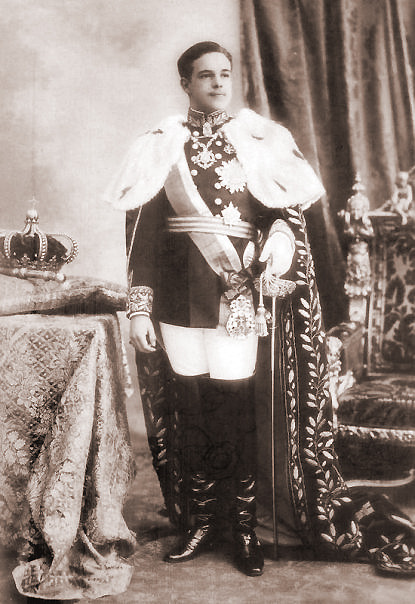
Reign: 1 February 1908 – 5 October 1910 Acclamation: 6 May 1908 Predecessor: Carlos I
Manuel II (15 November 1889 in Lisbon – 2 July 1932 in London), "the Patriot" ("o Patriota") or "the Unfortunate" ("o Desventurado"), was the last King of Portugal, ascending the throne after the assassination of his father, King Carlos I, and his elder brother, Luís Filipe, the Prince Royal. Before ascending the throne he held the title of Duke of Beja. His reign ended with the dissolution of the monarchy in the 5 October 1910 revolution, and Manuel lived the rest of his life in exile in Twickenham, Middlesex, England.

Manuel Maria Filipe Carlos Amélio Luís Miguel Rafael Gabriel Gonzaga Francisco de Assis Eugénio de Saxe-Coburgo-Gota e Bragança was born in the Palace of Belém, Lisbon, less than a month after his father King Carlos I ascended the Portuguese throne. He was the third child and second son of Carlos and Amélie of Orleans.
A member of the House of Bragança, he was baptized a few days later, with his maternal grandfather as godfather. The former Emperor Pedro II of Brazil,
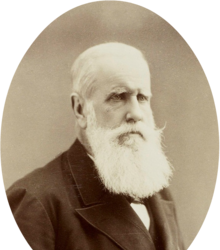
Manuel II's paternal great-granduncle, who had been deposed from the Brazilian throne on the day of Manuel's birth, attended the ceremony.
He received the traditional education of a member of the royal family, without the political preoccupations that befell his older brother, who was destined to become King.
Although Manuel was raised as a member of the upper class he took a more populist tone after ascending to the throne, and abandoned many of the court protocols. He studied history and languages, and by the age of six spoke and wrote French. He demonstrated a love of literature and reading, unlike his older brother who was more interested in physical activities. Manuel's upbringing included horse riding, fencing, rowing, tennis and gardening. He was a great lover of music, especially Beethoven and Wagner, and played the piano.
As a child, Manuel played with the children of Count of Figueiró, Count of Galveias and with other families of the Court.

In 1902, he was taught Latin and German by Franz Kerausch, later instruction was by Father João Damasceno Fiadeiro (Portuguese history); Marquês Leitão (Mathematics); M. Boeyé (French and French literature); Alfredo King (English and English literature), Father Domingos Fructuoso (Religion and Morals) and Alexandre Rey Colaço (piano).
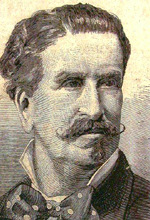
In 1903 he traveled with his mother and his brother to Egypt, on board the royal yacht Amélia,
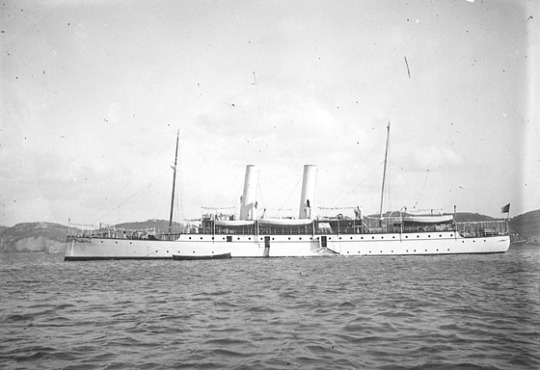
to expand his understanding of ancient civilizations. In 1907 he entered the Portuguese Naval Academy.
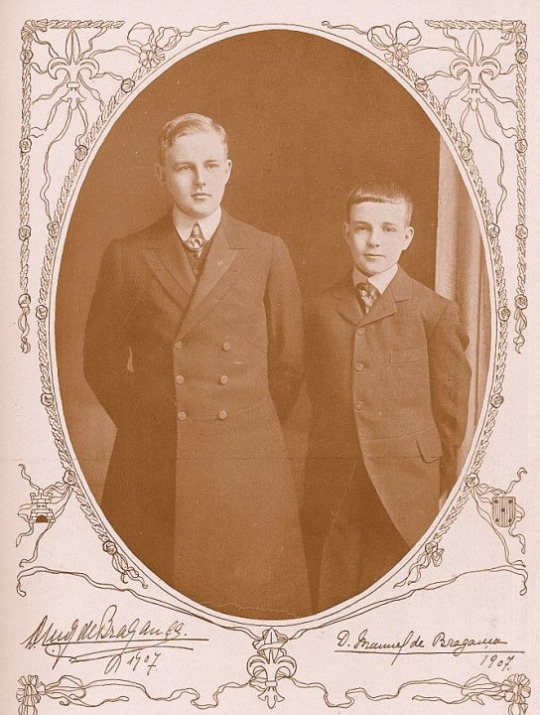
His future in the Portuguese Navy was abruptly shelved on 1 February 1908. On that day, the royal family returned from the Ducal Palace in Vila Viçosa to Lisbon. On their way to the royal palace, the carriage carrying King Carlos and his family passed through the Terreiro do Paço where shots were fired by at least two Portuguese republican activist revolutionaries: Alfredo Luis da Costa and Manuel Buiça. It is unclear whether the assassins were attempting to kill the King, the Prince Royal or the prime minister, João Franco.

The murderers were shot on the spot by the royal bodyguard and were later recognized as members of the Portuguese Republican Party. The King was killed; Prince Luís Filipe was mortally wounded; Manuel was hit in the arm; Queen Amélie of Orleans was unharmed. It was Amélie's quick thinking that saved her youngest son. About twenty minutes later, Prince Luis Filipe died, and Manuel became King of Portugal. The young King, who had not been groomed to rule, sought to save the fragile position of the Bragança dynasty by dismissing João Franco and his entire cabinet in 1908. The ambitions of various political parties made Manuel's short reign a turbulent one. In free elections held on 28 August 1910, the republicans won only 14 seats in the legislature.
His first act was to meet with his Council of State and request the resignation of João Franco, whose policies may have been responsible for the tragedy. He appointed a government of national unity, presided over by Admiral Francisco Joaquim Ferreira do Amaral.
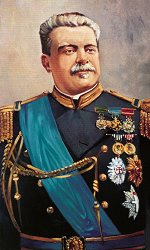
This quieted the republicans, but in retrospect was seen as weakness.
He opened the Royal Court Assembly on 6 May 1908 in the presence of national representatives, and affirmed his support of the constitution. The King received general public sympathy, due to the deaths of his father and older brother. He was protected by his mother, Amélia, and sought out the support of the experienced politician José Luciano de Castro.

Judging that the intervention of King Carlos was a reason for the events of 1908, he declared that he would reign, but not govern.
For his part, the new King tried to increase the monarchy's connection with its subjects. The King visited several areas of the country. His trips included stops in Porto, Braga, Viana do Castelo, Oliveira de Azeméis, Santo Tirso, Vila Nova de Gaia, Aveiro, Guimarães, Coimbra and Barcelos. During these visits, his subjects were captivated by the young king, and he was received warmly. On 23 November he traveled to Espinho in open the Vale do Vouga Railway. On his journeys, he ingratiated himself with the people with his candor and pious character.

However, he was not popular with republicans. One of them, João Chagas, the anti-monarchist journalist and propagandist of the Republican Party, warned the King of the problems that would develop when he declared:
"...your Highness arrives too young into a very old world...!"
During the 19th century, many intellectuals and politicians were preoccupied with the growth of the urban proletariat as a consequence of the Industrial Revolution. In Portugal, owing to lower levels of industrialization, this was not an important question, but it was exacerbated by an economic crisis and the Republican Party, who believed a republic would resolve the problems. This was the Questão Social (social question) of the times.
The Socialist Party had existed since 1875, but it never had representation in Parliament. This was not only because it was not popular, but also because the Republican Party was the principal channel of radical discontent within the political system. The King made some moves that did not infringe his constitutional restrictions, but which created incentives for the Socialist Party to lessen their support for the Republican Party. In 1909, Manuel invited the French sociologist, Léon Poinsard, to examine the social environment and report back to him. Poinsard wrote that the only way to combat clientelism, created by the system of rotational governments, would be a reorganization of the local administrations. Enthusiastically, the King wrote to the President of the Council of Ministers Wenceslau de Sousa Pereira de Lima, to make him aware of the reorganization of the Socialist Party (under Alfredo Aquiles Monteverde) and to remind him of the importance of working with the Socialists, "...so that, we will empty their supporters from the Republican Party, and orient them into a useful and productive force."
Notwithstanding the contacts made by the government of Artur Alberto de Campos Henriques with the Socialist Azedo Gneco, Venceslau de Lima considered this difficult after the Congresso Nacional Operário, which was boycotted by anarchists and republicans. For their part, the Socialists were enthusiastic about Royal support between Manuel and Aquiles Monteverde. Monteverde would later inform the King of the failure of the October 1909 trade union congress, but little was formalized between the socialists and the government, although they supported the work of Poinsard. During the government of António Teixeira de Sousa,
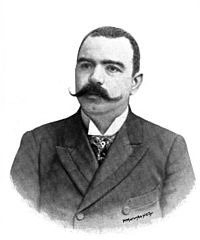
in July 1910, that the government created a commission to study the establishment of an Instituto de Trabalho Nacional ("Institute of National Work"), that had three socialists and included Azedo Gneco. However, Aquiles Monteverde would complain that the commission lacked the resources to be effective: specifically that permanent members and unlimited transport, in order for the Socialists to promote their propaganda. Manuel II informed the government, through the Minister of Public Works, that he agreed with the establishment of the Instituto de Trabalho Nacional, but by September, it was too late for the constitutional monarchy.
During his reign he visited many parts of northern Portugal, in addition to Spain, France, and the United Kingdom, where he was appointed Knight of the Order of the Garter, in November 1909. He cultivated a foreign policy that was close to Great Britain, which was not only the geo-political strategy that his father maintained, but it also reinforced his position on the throne by having a strong ally. The court also considered the marriage of a King of the House of Bragança to a British princess would secure the protection of the United Kingdom in any impending conflict. But, the country's instability, the assassination of the King and Prince Royal, and the drawn-out negotiations that were ended with the death of Edward VII,
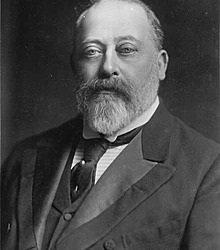
ended these pretensions. The old British monarch, a personal friend of Carlos, would have been the great protector of the House of Bragança, and without him, the liberal government of Britain had no interest in maintaining the Portuguese monarchy.
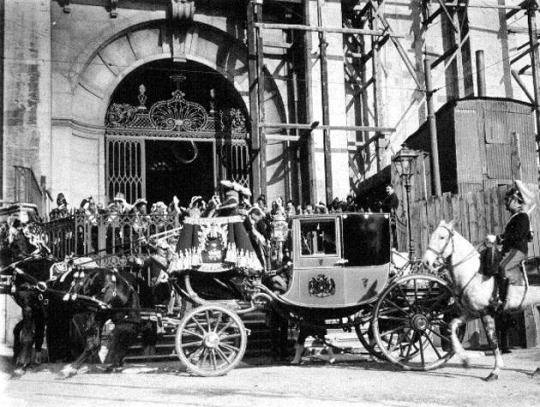
The stability of the government deteriorated; seven governments were established and fell in a period of 24 months. The monarchist parties continued to fragment, while the Republican Party continued to gain ground. The legislative elections on 28 August 1910 had elected 14 new representatives (resulting in an assembly that was divided: 9% Republican, 58% Government and 33% Opposition) which helped the revolutionary cause, but which made little importance since the Setúbal Congress (on 24–25 April 1909) had determined that the Republicans would take power by force. The murder of a prominent republican precipitated the coup d'état that had been so long in coming.
Between 4 and 5 October 1910, the Republican Revolution erupted in the streets of Lisbon. What started as a military coup commenced by soldiers, was joined by some civilians and municipal guards attacking the loyal garrisons and the royal palace, while the guns from the cruiser NRP Adamastor added to the cannonade. The Palace of Necessidades (then official residence of the young King) was bombarded, forcing Manuel to move to the Mafra National Palace, where he rendezvoused with his mother, Queen Amélia, and his grandmother, the Queen Mother Maria Pia of Savoy. There was little apparent popular reaction to these events: pictures from the square in front of the City Hall in Lisbon, where the declaration of the Republic occurred, did not show an overwhelming multitude, and even some in the military were fearful that their actions would not be successful. One republican commander, Admiral Cândido dos Reis, even committed suicide when he believed that the events had not succeeded.
One day later, once it was clear that the Republicans had taken the country, Manuel decided to embark from Ericeira on the royal yacht Amélia IV for Porto,

with armed Republicans arriving as the ship departed. It is unclear whether his advisers motivated Manuel to change his intentions or whether he was forced to change his destination en route, but the Royal Family disembarked in Gibraltar shortly later, after they received notice that Porto had fallen to the Republicans. The coup d'état was complete, and the Royal Family departed for exile, arriving in the United Kingdom, where he was received by the King.
During a visit to Paris in July 1909, the King met Gaby Deslys,

an actress and dancer, and immediately began a relationship that would last until the end of Manuel II's reign. It was thought that after this first meeting the King sent Deslys a pearl necklace worth $70,000: more gifts soon followed, including a diamond necklace with black and white pearl drops set in a platinum band. Their relationship was anything but discreet (she would arrive before night at the Palácio das Necessidades and would pass through Portugal unnoticed); abroad, meanwhile, they were on the front pages of newspapers in Europe and North America, especially after he was deposed. In public interviews, usually on trips, Gaby Deslys never negated the obvious, but always refused to comment on her relationship with the King. After his exile, they would continue to meet, especially while she had stage engagements in London. When Gaby moved to New York, in the summer of 1911, their relationship broke off.
In the spring of 1912, Manuel visited Switzerland, where he met Princess Augusta Victoria of Hohenzollern (1890–1966), and was deeply impressed by her. They were second cousins, both being great grandchildren of Ferdinand II of Portugal. In the following year, on 4 September 1913, Manuel married Princess Augusta Victoria, daughter of William, Prince of Hohenzollern. During the mass, which was celebrated in the Chapel of Sigmaringen Castle,
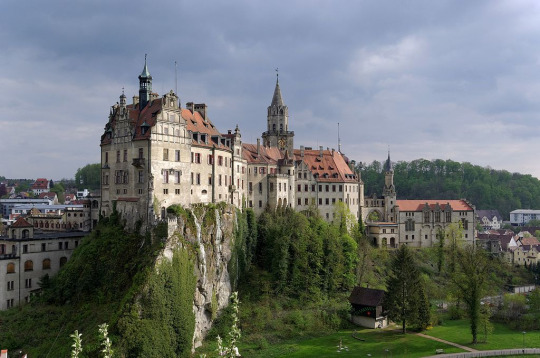
Manuel, wearing his Order of the Garter medallion and the sash of the Three Portuguese Orders, stood on a crate containing soil brought from Portugal.

The ceremony was conducted by Cardinal José Neto, Patriarch of Lisbon, then exiled in Seville, who had baptized Manuel as a young prince; Manuel was also assisted by the Prince of Wales (Edward VIII)

and King Afonso XIII of Spain,

as well as representatives of the royal houses of Europe (including Spain, Germany, Italy, France and Romania, in addition to the principalities and German kingdoms). After festivities which lasted two days, the couple went on their honeymoon to Munich, where the Princess fell ill and withdrew from the public. The marriage, a calm and serene union, lasted until the death of the former King; the couple had no children.
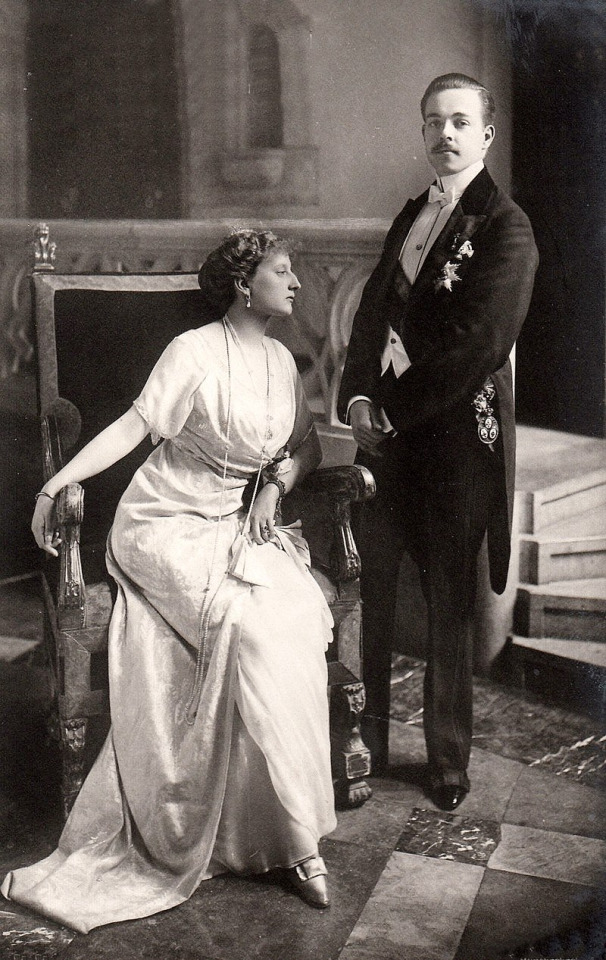
In exile, Manuel resided in Fulwell Park, Twickenham now in London (where his mother had been born). At Fulwell Park he tried to recreate a Portuguese environment, as the attempts to restore him to his throne (1911, 1912 and 1919) failed. He was active in the local community, attended services at the Church of St James, Twickenham, and became godfather to several children. In 1932 he donated a window to St James Church bearing the Bragança crest and depicting St Anthony to celebrate the 700th anniversary of the saint's death. His influence is also recalled by a number of toponymic references in the area: Manuel Road, Lisbon Avenue, and Portugal Gardens. He followed political events in Portugal, and was concerned with the anarchy of the First Republic, fearing that it could provoke a Spanish intervention and risk the country's independence.
While in exile, there was one case where the former King's direct intervention had an effect. After the overthrow of the government of Gomes da Costa, by General Óscar Fragoso Carmona,

in 1926, Costa was appointed Ambassador to London. Given the rapid succession of ambassadors during this period, the British government refused to recognize the new official's credentials. As the ambassador was to negotiate the liquidation of the Portuguese debt to the United Kingdom, the Minister of Foreign Affairs asked Manuel to straighten out the situation. The former monarch was delighted by the opportunity to help his homeland and communicated with many of his British contacts (including, probably, King George V)

in order to resolve the dispute. Even in exile Manuel continued to be a patriot, going as far as declaring in his 1915 testament his intention to transfer his possessions to the Portuguese State for the creation of a museum, and showing his interest in being buried in Portugal.

Manuel defended the entry of Portugal into the First World War and its active participation. He asked monarchists to desist from restoration efforts as long as the war continued. He even met with republicans, and at one time, solicited his involvement in the Portuguese army. But, contrary to his hopes, a majority of the monarchists did not follow his pleas for cooperation. Many of them backed the aspirations of Germany, and had hoped to see the victory of the Kaiser as another channel to restore the monarchy. Manuel believed that supporting Great Britain would guarantee the retention of overseas colonies, which would have been lost to German aggression even if the Germans were supported in the conflict. Of his close subordinates who offered their support to the Republic, none were accepted.
Manuel attempted to make himself available to the Allies, wherever they saw use, but was disappointed when he was assigned a post in the British Red Cross. He characteristically put all his efforts into the role, participating in conferences, fund drives, visits to hospitals and the wounded soldiers on the front, which ultimately gave him a lot of gratification. The visits to the front were difficult on the French government, but his friendship with George V was sufficient to alleviate their concerns. Regardless, most of his efforts were not credited; years later, in an interview with António Ferro, he lamented, "The operating room in the Portuguese Hospital in Paris, during the War, was constructed by me. Do you know what they put on the plaque? 'From a Portuguese in London'." The King was also responsible for the creation of the Orthopedic Department at Shepherd's Bush Hospital which, at his insistence continued to function until 1925, in order to continue to treat the disfiguring effects of the war. A proof of his recognition by the British was by his friend George V, who invited him to be with the King during the victory celebrations during the parade of soldiers in 1919.
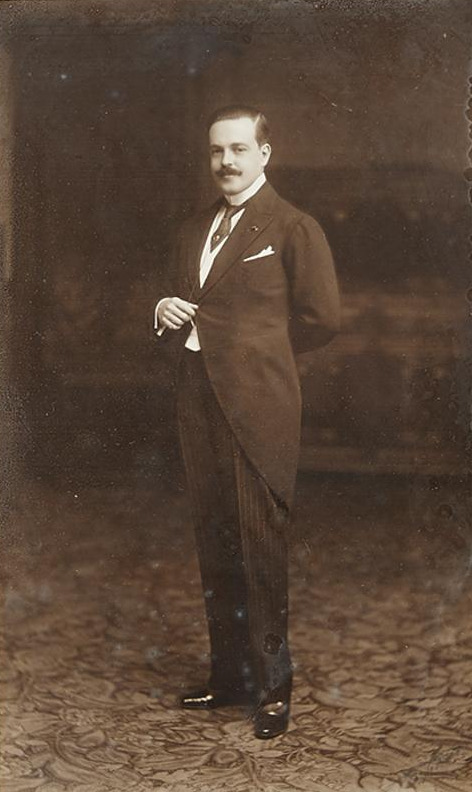
Since 1911, the Portuguese monarchists-in-exile concentrated in Galicia, Spain in order to enter Portugal and restore the monarchy but without the tacit approval of the Spanish government. The monarchists were led by the charismatic Henrique Mitchell de Paiva Couceiro, a veteran of the African colonial campaigns. The Paladin, as the Portuguese newspapers called him, believed that demonstrating a show of force would force the rural people to rise-up and support the restoration. But he was wrong; poorly prepared and badly financed, his forces encountered apathy from the rural population and the incursions ended with retreats into Galicia.
For his part, Manuel supported these incursions the best way he could, but his financial resources were limited. He also faced a group of monarchists who were not clear supporters of his claim to the throne: one attack was made under a blue and white flag, but without the crown, while Paiva Couceiro himself declared at one time that his movement was "neutral" and wanted a plebiscite on the form of the new regime. It was only after he traded correspondence with Couceiro that the King was able to support the Galician monarchists, who had promised to support the 1826 Constitution. The second incursion, in 1912, although better prepared did not succeed because the Spanish government was forced to cede to Republican diplomats the illegality of monarchist encampments in Galicia and disarmed the remaining combatants within its territory. Manuel was never able to restore his kingdom by force and always defended that the monarchists should organize internally in order to reach power legally (by elections). This was not accepted by militant monarchists who, in the following years, continued their badly prepared attempts to restore the monarchy (for example on 20 October 1914), creating anarchy in the streets. His preoccupation worsened at the beginning of the Great War: Manuel was fearful that the United Kingdom would ally with Spain, in light of Portugal's instability, and that Spain would want to annex Portugal, as the price for Spain's entry into the War.
After the failure of the first monarchist incursion, and with Manuel appearing relatively unenthusiastic for a restoration of the monarchy (and entirely against armed counter-revolution), another group of royalists attempted to legitimize the claims of the descendants of Miguel I to the throne. In order to counter this, the King entered into direct negotiations with the Duke of Bragança's representatives: he attempted to establish himself as the rightful king and, according to the Integralismo Lusitano group, he recognized the descendants of Miguel as being in line to the throne of Portugal. In fact, there was an encounter between Manuel II and Miguel
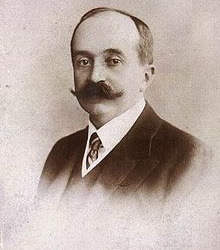
in Dover on 30 January 1912, where both exchanged protocols. The results of this meeting remain controversial: although there was an accord on challenging the republic, there remained no clear agreement on hereditary lines of succession, and Manuel still retained his claim to the throne.

Some monarchists continued unsuccessful counter-revolutionary activities during the War, while the former King continued to condemn their actions and to exhort them to restore the monarchy at the ballot-box. This option seemed viable after the dictatorship of General Pimenta de Castro (January 1915) broke the momentum of the Democratic Party, who attempted to garner sympathies from the conservative right, by removing restrictions imposed on monarchist groups on 5 October. Between April and May 1915, 55 monarchist centres opened (33 in the north and 12 in the centre of the country), causing many republicans to close ranks and on 14 May 1915 the revolution returned to the streets, when 15,000 armed civilians and the soldiers from the Navy tried to maintain the loyalty of the Army to the government. After three days of combat 500 deaths and more than 1,000 wounded, the Democratic Party retained control and the monarchist groups were once again declared illegal. During the Sidónio Pais government, Pais cultivated support from conservative factions and incorporated a re-establishment of a regime based on universal male suffrage. His assassination allowed moderate republicans to re-establish control, but the creation of military juntas in the provinces of the north, with monarchist tendencies, created expectations of a possible monarchist restoration through a military coup d'état.
Manuel continued to plead for calm at the end of the War; while not abandoning the possibility of taking action in the future, he insisted on waiting to the end of peace negotiations in Paris: he was fearful that continued anarchy in Portugal would prejudice its negotiating position. But, for Paiva Couceiro and the other Integralists, this was the moment: they awaited the royal authorization of the King's adjunct Aires de Ornelas. Receiving a memorandum that requested this authorization, and convinced that this action would not occur immediately, Ornelas wrote on the margin, Go on. Palavras de El-Rei, and signed the document. On 19 January 1919 a thousand soldiers and some artillery, under the command of Paiva Couceiro occupied Porto, in order to restore the Constitutional Monarchy, and its King Manuel II. A provisional government was established that controlled Minho, Trás-os-Montes (with the exception of Chaves, Mirandela and Vila Real), as well as part of the district of Aveiro, but contrary to Couceiro's expectations, the rest of the country did not rise.
In Lisbon, Aires de Ornelas was caught completely by surprise, but he could not escape with other monarchists to the safety of the 2nd Regimental Lancers, in Ajuda. There the number of refugees, who suffered as the republican reprisals increased, and the commander removed his forces and those civilians, marching them to Monsanto, where the 4th, 7th and 9th Cavalry and the 30th Infantry Battery from Belém were entrenched. Aires de Ornelas wavered in his support, which risked the possibility that Integralists would transfer their loyalty to Miguel's supporters, or assume the leadership of the monarchist movement. In a small area, and circled by Republican forces, the monarchists surrendered on 24 January. With the failure of the Restoration in the center and south of the country, luck turned on Paiva Couceiro. On 13 February a part of the Republican National Guard deserted and restored the Republic in Porto. Those monarchists who did not escape were incarcerated and subsequently sentenced to long-term imprisonment. The King, in exile, did not hear of the failure and was informed only after reading the reports in the newspapers.
Although it is not likely that such a pact took place, it is said that in 1922, with cooling of relations between monarchists, Integralismo Lusitano and the King, and mindful that his marriage to Augusta Victória had not produced heirs, Manuel, in a Paris meeting in April 1922, represented by his adjunct Aires de Ornelas, and Miguelist representatives Infanta Adelgundes, who was by now calling herself Duchess of Guimarães, and tutor to Duarte Nuno, agreed that owing to an heir, the rights of succession would pass to Duarte Nuno. Integralists disagreed because in their view the agreement failed to make reference to the reestablishment of a traditional monarchy, which was fundamental to their assertions. Integralismo Lusitano withheld their support, and on September 1925, Aldegundes in a letter to Manuel, repudiated the agreement owing the continue operation of the Constitutional Newspaper (the Integralist paper was closed as part of the accord) and the lack of Integralist participation.

Manuel was always an avid reader and, during his exile, dedicated himself to the study of literature, penning treatises on Medieval and Renaissance literature in Portugal. Following the First World War and with more free time, apart from his contacts with monarchist organizations, he dedicated himself to these studies (a tradition that was instilled in him by his father). Initially, he was interested in writing a biography, and began research on a biography of Manuel I of Portugal,

who he believed was badly treated by other historians. He contracted the services of the bibliographer Maurice Ettinghausen in 1919, to find older books for his project, and was helped by the dissolution of many private collections after the implementation of the Republic.
By 1926, Manuel had abandoned the idea of a biography and concentrated on descriptions of older books in his library (itself, a complete library of older works). More than a simple list, the work allowed Manuel to write of the glories of Portugal, writing not just a bibliography but also an examination of the authors and the context of their writings. His interpretation was scientifically rigorous, and resulted in a final work that was marked by a nationalism and the exaltation of ancestral valor. His examples were limited and illustrated by facsimiled copies of the works, both written in English and Portuguese. The first volume of the work Livros Antigos Portuguezes 1489–1600, da Bibliotheca de Sua Magestade Fidelíssima Descriptos por S. M. El-Rey D. Manuel em Três volumes was published in 1929. Manuel delivered, by hand, a copy of his work to his friend George V at Windsor Castle. The work was received well by critics, and the King dedicated himself to the second volume, which covered the period 1540 to 1569. But the project was terminated prematurely in 1932, when Manuel died unexpectedly: the third volume was posthumously published under the supervision of his librarian, Margery Winters. His completed works gave the King a respectful reputation among Portuguese historians, and his bust was added to the entrance atrium of the National Library in Lisbon.

Manuel died unexpectedly in his residence on 2 July 1932, via suffocation by an abnormal swelling in the vocal folds of his larynx, or tracheal oedema. The Portuguese government, at that time led by António Oliveira de Salazar, authorized his burial in Lisbon, after a state funeral. His body arrived in Lisbon on 2 August 1932, on board the British cruiser HMS Concord
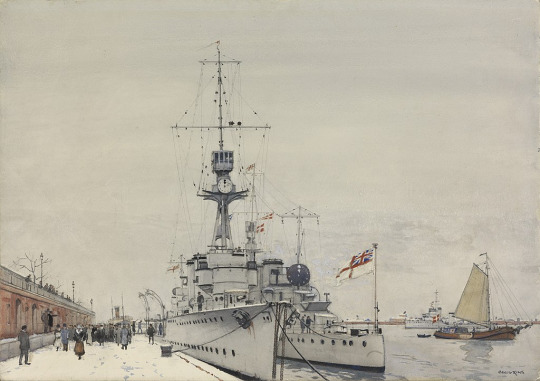
which had made the journey from the United Kingdom and sailed into the Tagus River to deliver the coffin of the former King. The body was received at Praça do Comércio, where a crowd of people had gathered to follow the coffin to São Vicente de Fora and the roads were inundated with people interested in seeing the funeral procession. His body was interred in the Royal Pantheon of the House of Bragança in the Monastery of São Vicente de Fora.
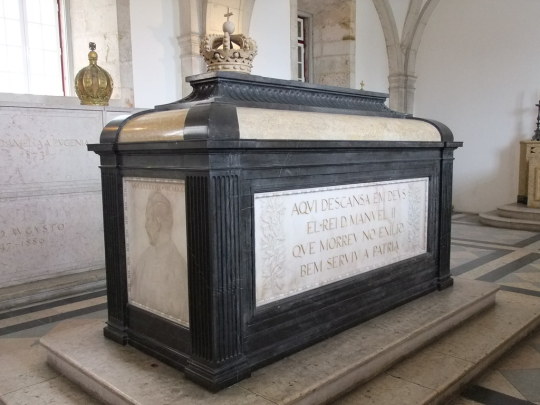
By some he was given the nickname O Patriota ('The Patriot'), for his preoccupation with the national identity; O Desventurado ('The Unfortunate'), because he lost his throne to the Republic; and O Estudioso or O Bibliófilo ('The Studious' or 'The Bibliophile') for his love for Portuguese literature. Monarchists also referred to him as O Rei-Saudade ('The Missed King'), for the longing that was felt when the monarchy was abolished.
His death has been regarded as suspicious by some because of the fact that he had been playing tennis on 1 July and was apparently in excellent health. An incident surrounding his sudden death was mentioned in the autobiography of Harold Brust, a member of Scotland Yard Special Branch in charge of protecting public figures. In his memoirs, Brust speaks of an incident which probably occurred in 1931 in which an intruder was discovered in the grounds of Fulwell Park who, when arrested, the Police confirmed as being a prominent member of a Portuguese republican terrorist group known as the Carbonária and who was subsequently deported to Lisbon. To date the identity of the intruder has not been confirmed. Questions remain as to the reason for the man's intrusion.
Since both the Dover and Paris Pacts did not resolve the issue of succession and there are no known documents proving them, there was no direct heir to the defunct throne. Manuel also made it clear that the branches of the Portuguese royal family (including the Imperial family of Brazil, the Bragança-Orleans, and the descendants of the Duke of Loulé) ended with the last direct male heir to the House of Bragança. Still, the monarchist Integralismo Lusitano movement acclaimed Duarte Nuno, Duke of Bragança
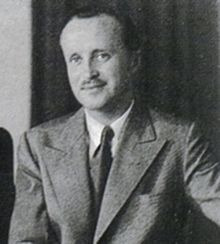
as King of Portugal, since Miguel I of Portugal, on the death of his grandchild, was head of the Portuguese Royal Family. Their justification, ironically, included the fact that both branches had met to determine the line of succession in Dover and Paris, even though those accords were both later repudiated.
After King Manuel's death, the dictator António de Oliveira Salazar authorized the return of the banned branch of the Braganças (ex-King Miguel's descendants) and founded, with the sale of the King's English estate and some of his remaining personal possessions, the Foundation of the House of Bragança, according to King Manuel's desire to leave his personal fortune to the Portuguese people.
7 notes
·
View notes
Text

"venho encontrar-te para uma traição." António Franco Alexandre
#poema#poesiaexperimental#dinheiro#literatura#artecontemporanea#real#intervençãourbana#artesvisuais#artesplásticas#projeto#performance#notas#notes#divagações#filosofando#arquivopoetico#clubepoetico#meuprojetoautoral#poemasemdinheiro
1 note
·
View note
